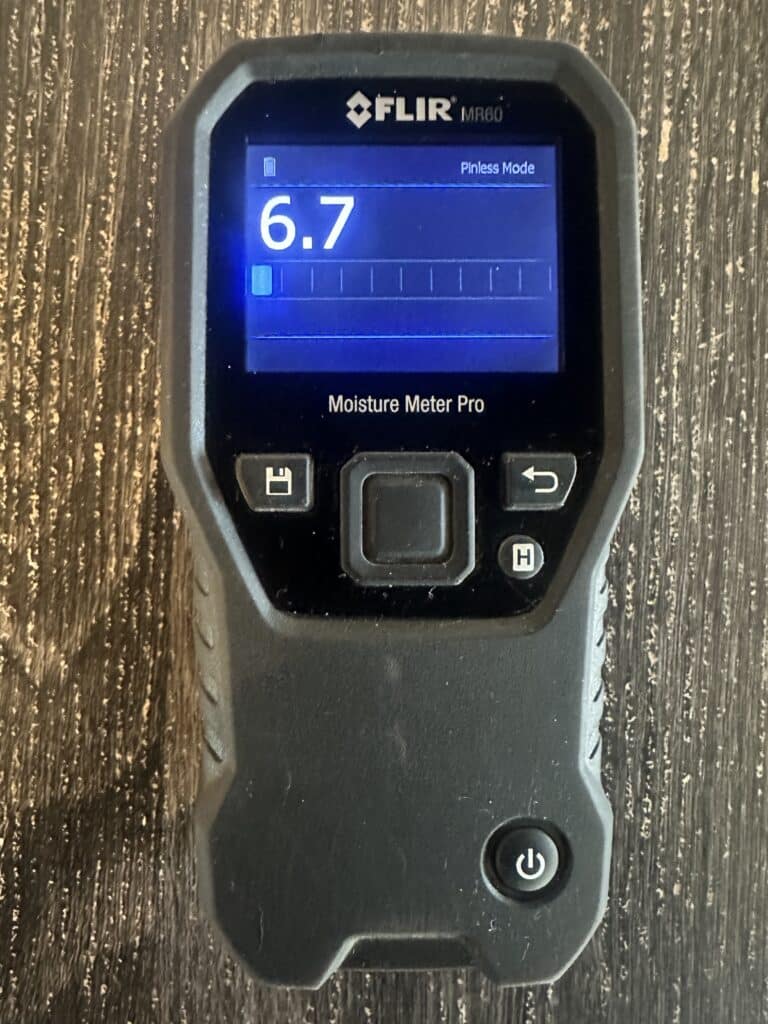
The FLIR Moisture Meter Pro is an outstanding tool for home inspections and moisture detection. Its dual-function capability, featuring both pin and pinless moisture detection, makes it incredibly versatile for checking a wide range of materials, from drywall to wood and concrete. The high-resolution display and intuitive interface make it easy to read and interpret results, even in low-light conditions. Plus, its durable build and reliable accuracy ensure long-term performance. Whether you’re a professional home inspector or a DIY enthusiast, this moisture meter is a must-have for detecting hidden moisture issues quickly and efficiently.
Why Moisture Meters Are Important for Home Inspections
Moisture problems in a home can lead to serious issues such as mold growth, wood rot, and structural damage. Identifying excess moisture early is crucial for maintaining a property’s integrity and preventing costly repairs. That’s where moisture meters play a vital role. These tools allow home inspectors to detect hidden moisture problems before they become major concerns. By measuring moisture levels in materials like drywall, wood, and concrete, moisture meters provide homeowners and buyers with valuable insights into a property’s condition.
What Is a Moisture Meter?
A moisture meter is a device used to measure the moisture content in various building materials. These meters are commonly used during home inspections to assess potential water damage and moisture intrusion. There are two main types of moisture meters:
- Pin-Type Moisture Meters: These use two metal probes to penetrate the surface and measure moisture within walls, flooring, and other materials. They provide precise readings but may leave small puncture marks.
- Pinless Moisture Meters: These use electromagnetic sensors to scan surfaces without penetration, making them ideal for non-invasive moisture detection. While they provide fast results, they may not detect moisture deep within materials.
Some advanced models, such as the FLIR Moisture Meter Pro, combine both pin and pinless technology for more versatile moisture detection.
Why Moisture Meters Are Essential for Home Inspections
Excess moisture often goes unnoticed until it causes major damage. A property may appear dry on the surface, but hidden moisture could be lurking in walls, floors, or crawl spaces. If left untreated, this moisture can lead to:
- Mold and mildew growth, which can cause health problems.
- Wood rot and structural damage, weakening the home’s foundation.
- Electrical hazards, increasing fire risks.
- Higher energy costs, as damp insulation loses its effectiveness.
During an inspection, moisture meters help detect problem areas, including:
- Basements and crawl spaces – Common moisture-prone areas due to poor drainage.
- Attics and roofs – Potential leaks and ventilation issues.
- Bathrooms and kitchens – High-risk zones for plumbing leaks and condensation buildup.
- Exterior walls and siding – Areas vulnerable to water intrusion from improper sealing.
By identifying moisture issues early, homeowners can take preventive measures such as sealing leaks, improving ventilation, or replacing damaged materials, preventing expensive repairs down the line.
How to Choose the Best Moisture Meter for Home Inspections
For home inspectors and DIY homeowners, choosing the right moisture meter depends on the materials being tested and the level of accuracy required. High-quality models offer features such as:
- Adjustable settings for different materials.
- Digital readouts for precise moisture measurements.
- Built-in thermal imaging to detect hidden moisture issues.
Investing in a reliable moisture meter ensures a thorough home inspection and helps protect against costly water damage.
Conclusion
Moisture meters are an essential tool for home inspections, providing fast, accurate, and non-invasive moisture detection. Whether you’re a home inspector, real estate investor, or homeowner, using a moisture meter can help prevent expensive repairs and maintain a safe, dry home.